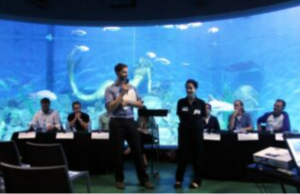Speeches for Events: Introductions, Awards, Graduations, & More

Have you ever been moved watching an acceptance speech given by a surprised winner of a one of the big media awards, such as an Oscar or an Emmy? What was it about the speech that worked for you? There are some basic speech formulas for introducing speakers, presenting and accepting awards, and emceeing an event where you guide an audience through a whole program.
Introducing a Speaker

If you’re introducing a speaker, the main thing is to remember is to focus on the speaker – not you. You’re just there to prepare the audience for the speaker and then get out of the way. Unless you’re introducing someone in a format that requires you to give a significant speech, don’t try to be clever, funny, or insightful. These are all great qualities, but they run the risk of upstaging the person you’re introducing. No band wants to be outplayed by the opening act.
Public speaking expert Deborah Grayson Riegel outlines three main goals in introducing a speaker:
- Focus the attention of the audience on the speaker
- Build up the speaker’s credibility – tell listeners why they should care what this person has to say
- Generate curiosity and excitement about what the speaker will present[1]
Here are some dos and don’ts for introducing a speaker:
| Do | Don’t |
|---|---|
|
|
The following video offers a brief speech introducing a speaker. Note how the introducer engages the audience and focuses totally on the upcoming speaker, offers essential information, and keeps it short.
Presenting an Award
In an award speech, a speaker or emcee introduces an award and the winner. The introduction is meant to build excitement, and often the winner is not known until just before the award is to be presented.
Introduce yourself and thank the group or organization asking you to speak. Then name the award and explain briefly about the award you are presenting. Be sure to include the scope of the award, be it local, regional, national, or international.
Next explain what the winner accomplished to win this award. Did they write a paper or did they lead for a cause? Did they grow the largest pumpkin, finish first in a marathon, or bring community groups together to fight for justice? Your job is to present the facts and summarize the story behind their story.
Lastly, if there are other people in attendance who were competing with the winner, make sure to acknowledge them in the time you were allotted. Be sure to finish with the actual award presentation to the person or team, raising your voice and starting the applause after inviting them to receive their award.
Accepting an Award
If you know that you have been nominated for an award, then an acceptance speech, like any other speech, should be prepared in advance. Thank the givers of your award first. State how much and why you are grateful for this honor and, if possible, name the people in the organization individually.
Then thank and give credit to those who helped you achieve the award including family, friends, mentors, and others who supported you in this endeavor. Include their names, their roles, and how their combined efforts made it possible for you to receive this honor. If you can’t name all the individuals, name the groups as time will allow.
Briefly share what the honor of the award means to you, and be generous with your praise and your gratitude toward your colleagues and the organizations involved. Smile and carefully look for directions on leaving the stage.
In the next video, environmental and indigenous-rights activist Berta Cáceres, co-founder of the Council of Popular and Indigenous Organizations of Honduras (COPINH), gives her acceptance speech upon winning the Goldman Prize for grassroots environmental activism in 2015. She organized the Lenca people of Honduras to force the world’s largest dam builder to pull out of the Agua Zarca Dam project on the Río Gualcarque. Tragically, Cáceres was assassinated the following year.
You can view the transcript for “Berta Caceres acceptance speech, 2015 Goldman Prize ceremony” here (opens in new window).
What to watch for:
In the case of winning an award for a social cause (in this case, environmental activism), it is common to focus on the severity of the problem at hand, that is, to shift the focus from yourself to the problem you are fighting against. Note how Cáceres begins by framing the cause within the belief system and worldview of the Lenca people. She then explains the mission of the organization she helped to found. Next she turns to her call to action. The ending of her speech reminds us that gratitude and humility are the most important elements of an acceptance speech. If thanks aren’t in line with the gravity of the topic, a dedication can serve a similar purpose.
Graduations
A graduation (or commencement) speech is designed to recognize and celebrate the achievements of a graduating class or other group of people. Nearly all of us have sat through commencement speeches at some point in our lives, some good and some bad. One famous and well-thought-out commencement speech was given by famed Harry Potter author J. K. Rowling at Harvard University in 2008. J. K. Rowling’s speech has the perfect balance of humor and inspiration, which are two of the main ingredients of a great commencement speech.
If you’re ever asked to deliver a graduation speech, consider these characteristics:
- If there is a specific theme for the graduation, make sure that your commencement speech addresses that theme. If there is no specific theme, come up with one for your speech. Some common commencement speech themes are commitment, competitiveness, competence, confidence, decision making, discipline, ethics, failure (and overcoming failure), faith, generosity, integrity, involvement, leadership, learning, persistence, personal improvement, professionalism, reality, responsibility, and self-respect.
- Although you can talk about your own experience, make sure to place that experience into a broader context relatable to all of the graduates.
- Use humor. Commencement speeches should be entertaining and make an audience laugh.
- Be brief!
This video offers a good example of how a graduation speech can be both personal and global, placing personal experience within a broader context in order to support the speaker’s theme.
Emceeing an Event
Emceeing an Event means that you have to know both how to introduce the event and how to keep it moving seamlessly throughout the time.
Introducing the Event
When introducing an event, you have four main goals. These goals are the minimum ground you need to cover in your introduction. How you do so, and whether you do more, will depend on the amount of time you have to speak.
-
Make the audience feel welcome and appreciated. Your opening should welcome the audience and thank them for being there.
-
Express thanks and appreciations. You should also recognize anyone who deserves thanks for putting together or hosting the event.
-
Explain the goals of the event and/or of the hosting organization. Here’s where your introduction will deepen and expand if you have the time for it. You might tell stories or share data about the impact of the organization whose event it is or talk in more detail about what participants can expect from the event to come.
-
Create excitement and anticipation for the activities to follow. Your focus should be on the event that you’re kicking off; stay focused on the future, not the past, and on the event, not yourself.
Some events, especially academic events and some non-profit or political events, begin with an Indigenous Land Acknowledgement. A land acknowledgement or territorial acknowledgement is a formal statement, often spoken at the beginning of a public event, that it is taking place on land originally inhabited by or belonging to indigenous people. To learn more about Indigenous Land Acknowledgement, the Native Governance Center has put together an excellent guide (opens in new window).
Managing the Event
Being the emcee (master of ceremonies) is easier the more speaking experience you have, but it is possible to successfully host an event as a beginning speaker.
Being an emcee will use everything you learned about speaking for special occasions and more. The most important thing to remember is this is more of a marathon than a sprint. You need to keep the energy high and the mood positive throughout the event. So start with being excited, and if you are scared, GREAT! Channel that energy into the excitement you need using the preparation tips below.
Speaker and author Kwesi Millington offers the following seven tips for being a great event emcee:[2]
-
Know the Agenda. The more detailed, the better: you should know what should happen at what time and how long each part should take.
-
Keep Your Energy High. Millington suggests self-talk and music to pump yourself up to bring 100% energy to the event.
-
Memorize Your Opening. Some parts of the event will be impromptu or ad-libbed; your opening, though, should be scripted and rehearsed. The opening sets the tone for the whole event, so it’s important to get it right.
-
Learn About the Other Speakers. Millington suggests learning one fact about each person you’re bringing to the microphone, so that you can personalize your introduction.
-
Always be Communicating. Even if you’re not on stage, you should be mixing with the crowd and keeping the energy up.
-
Interact with the Audience. The best way to keep the energy high and the mood positive throughout the event is to involve the audience, whether by asking questions or getting them to move around.
-
Close with Inspiration. As you close up the event, try to leave the audience with something to think about, something to lift them up.
You can view the transcript for “How to be the Perfect Emcee at an Event or Wedding” here (opens in new window).
Here is the video with accurate captions: How to be the Perfect Emcee at an Event or Wedding (opens in new window).
Dedications
A speech of dedication is delivered when a new store opens, a building is named after someone, a plaque is placed on a wall, a new library is completed, and so on. These speeches are designed to highlight the importance of the project and possibly those to whom the project has been dedicated.
When preparing the speech of dedication, start by explaining how you are involved in the dedication. If the person to whom the dedication is being made is a relative, tell the audience that the building is being named after your great-uncle who bestowed a gift to his alma mater.
Second, you want to explain what is being dedicated. If the dedication is a new building or a preexisting building, you want to explain what is being dedicated and the importance of the structure. You should then explain who was involved in the project.
Third, explain why the structure is important for the community where it’s located. If the dedication is for a new store, talk about how the store will bring in new jobs and new shopping opportunities. If the dedication is for a new wing of a hospital, talk about how patients will be served and the advances in medicine the new wing will provide the community.
This very brief video presents Walt Disney’s dedication speech at Disneyland in California.
